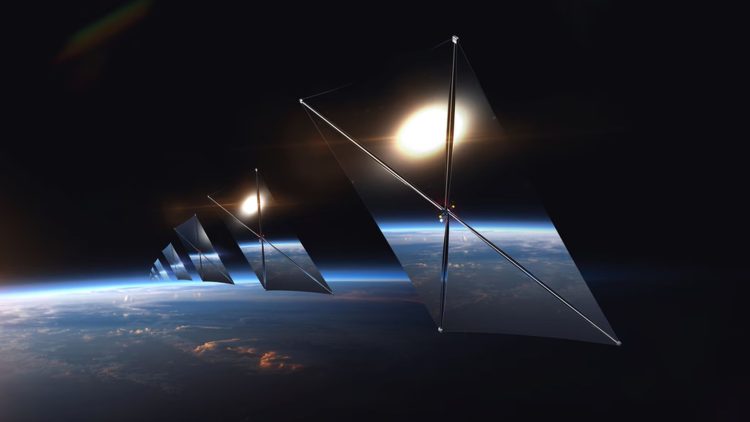Reflect Orbital, a California-based startup has introduced a novel concept aimed at enhancing solar power generation. The company plans to launch 57 satellites equipped with large, reflective Mylar mirrors into space, to extend solar energy production beyond traditional daylight hours. This innovative approach has the potential to address one of the key challenges currently facing the renewable energy sector.
Let there be light ☀️https://t.co/olcQP4KpVa pic.twitter.com/bSVxn87xjB
— cole (@colecallinan) August 22, 2024
Reflect Orbital’s bright idea faces astronomical concerns
At the International Conference on Energy from Space, Reflect Orbital‘s CEO, Ben Nowack, articulated the company’s vision. The plan entails the deployment of satellites into a sun-synchronous polar orbit, where they will remain at an altitude of 370 miles above Earth. Each satellite will be equipped with a 33-foot-square mirror, designed to redirect sunlight toward solar power plants on the ground. This could provide an additional 30 minutes of sunlight during periods of peak demand, enabling solar farms to continue generating electricity even before sunrise and after sunset.
The concept is based on a fundamental observation: solar energy is most needed when it is least available, such as during early morning or late evening hours. Reflect Orbital’s orbiting mirrors could alter this dynamic, enabling solar farms to offer more consistent power and potentially higher returns during those critical periods.
Reflect Orbital price: Economics of sunlight-as-a-service
Reflect Orbital’s ambitious plan is not merely an endeavor to illuminate regions where sunlight is typically scarce. Additionally, the company is dedicated to ensuring the economic viability of this concept. The price of a Reflect Orbital satellite is currently estimated at $100,000, with the launch cost for each satellite estimated at $150,000 using a SpaceX Falcon 9.
However, Reflect Orbital anticipates a considerable reduction in costs, particularly with the advent of SpaceX’s Starship launches, which could potentially reduce the launch cost to a mere $30,000 per satellite. This could render the project not only feasible but also profitable, with each satellite expected to generate approximately $175,000 in revenue annually. The potential for profitability becomes even more attractive when considering that the company is aiming for a 20-year lifespan for future satellite generations, thereby doubling its economic efficiency.
Sunlight after dark: Illuminating cities with Reflect Orbital
Reflect Orbital’s research and development activities extend beyond the mere expansion of solar energy production. They also encompass the investigation of methods for providing sunlight to locations that experience prolonged periods of darkness. The company intends to offer a service whereby cities can purchase blocks of sunlight, with the potential to provide illumination in areas lacking street lighting or in regions experiencing prolonged periods of darkness during winter. This could be particularly beneficial in regions such as the Yukon, where winter darkness can persist for up to 22 hours per day. Envision the ability to illuminate a construction site or a city center with sunlight, even during the depths of winter. Reflect Orbital’s service could provide daylight on demand, thereby creating novel avenues for urban planning and public safety.
How realistic is it for Reflect Orbital to sell sunlight?
The concept of selling sunlight may appear to be a futuristic one, but Reflect Orbital is striving to make it a tangible reality. By launching a constellation of satellites with mylar reflectors, the company aims to facilitate the delivery of sunlight to solar farms and cities when it is needed most. The concept is based on sound physics and tested technology; however, the challenge lies in scaling the operation and managing the potential impacts, such as light pollution and the cost of implementation. Reflect Orbital’s approach, including a pilot launch of two satellites, is designed to prove the viability of their concept. If successful, this could revolutionize how we think about solar energy, making sunlight a commodity that can be traded and distributed on a global scale.
Sharing a bit more about Reflect Orbital today. @4TristanS and I are developing a constellation of revolutionary satellites to sell sunlight to thousands of solar farms after dark.
We think sunlight is the new oil and space is ready to support energy infrastructure. This… pic.twitter.com/5WRb8etAv0
— Ben Nowack (@bennbuilds) March 13, 2024
Reflecting on past experiments and challenges
The concept proposed by Reflect Orbital is not entirely novel. In the 1990s, Russia conducted experiments with analogous technology, and contemporary initiatives such as the University of Glasgow’s SOLSPACE are also investigating this frontier. Nevertheless, the proposal has given rise to a certain degree of debate. Those with a critical perspective, including astronomers such as Andrew Williams from the European Southern Observatory, have expressed concern about the potential for light pollution, which could interfere with astronomical observations.
If not carefully managed, these satellites may become brighter than the stars, disrupting the night sky. Reflect Orbital, however, remains optimistic, having already conducted successful tests using a hot air balloon to simulate the satellite’s function. The next step for the company is to launch a prototype satellite for more efficient use of solar energy and clean energy next year.
Featured image credit: Reflect Orbital





